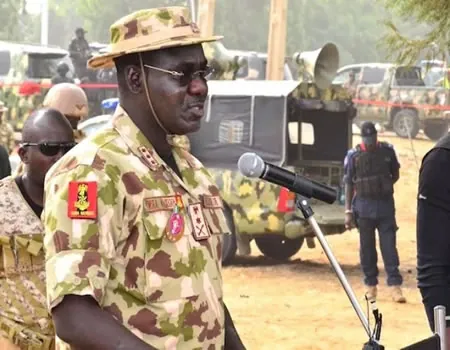

Chief of Army Staff (COAS), Lt.-Gen. Tukur Burutai


The army’s initiative is no doubt a good one and it is in tandem with the global trend whereby security agencies are becoming increasingly involved in the production of defence equipment and civilian products locally. However, it is debatable that the military institutions in the country have fulfilled the aforesaid objectives. The existing military institutions, in all honesty, have yet to acquit themselves creditably in the areas of production of light weapons and/or reducing tension in their areas of domicile. The siting of the Army University in the North-East may have been informed by the need to rein in insurgency in that region but the establishment and location of military institutions have proven to be incapable of preventing or tackling youth restiveness.
Virtually all the military institutions and police colleges in the country are sited in the North, yet the security issues in the North today are far graver than those in the South. Just like the unabashed lopsided appointments into the top security echelons in the country are yet to positively impact the security situation in the North in any significant way, the continued concentration of military institutions in that section of the country has not achieved, and is unlikely to achieve, the lofty objective. The challenges thrown up by deep-rooted socioeconomic issues of poverty and ignorance, which were in turn occasioned by protracted official neglect, are most unlikely to yield ground to the prescription of upgraded training in military strategy and tactics.
There is also the critical issue of disaffection by the other major section of the country which feels perennially short-changed in the location of military institutions. The question is even being asked as to whether the South is not suitable for military institutions. National unity in a federal arrangement tends to have greater chance for success in an environment where equity and fairness prevail. Nepotism and unbridled advancement of sectional interest by the political leadership tends to weaken the bond of oneness in a federation. No federation that aspires to make all-inclusive development and progress is run in that manner. And the issue of security is even more sensitive. Concentration of security top appointments, military installations and institutions in a section of the country may give rise to questions about the belief in and commitment of the political leadership to the long-term viability of the federation.
At a time when the country is beset with multifarious challenges that require unanimity of purpose to tackle, official policies and decisions should not repeatedly rattle national cohesion. Nigeria is not a nation and no one should make any pretence about it. If it were a homogenous nation, the need would not have arisen for a federal system of government in the first place. Therefore, in addition to other important attributes such as competence, honesty and integrity, the political leadership should be the type that has the capacity and willingness to appreciate the sensitivity engendered by the country’s diversity and manages same dexterously for the attainment of national harmony and progress. These are the minimal requirements of leadership in order to foster national well-being.
In the different facets of national development which include diversity in the official human capital utilisation, no section of the federation should be taken for granted or neglected. Every section must be involved and integrated in the efforts to attain the country’s collective aspirations. The Army University may have come to stay in the North and it may not serve any useful purpose to advocate its relocation to the South even though that would appear quite appropriate and imperative. However, it is in the overall interest of the country to point out the recurring anomaly while deliberately avoiding the temptation to pull apart the already tenuous and taut string that binds the country together. It is nonetheless hoped that going forward, the government will be more circumspect and learn to make recourse to the time-tested principles of fairness and equity while making major decisions. This is what is ordinarily expected in a pluralistic state.
The Esa-Oke Community in Osun has appealed to the state government to...
Tragedy struck Yakasai Quarters in Kano Municipal Local Government Area in the early hours of…
Tragedy struck Yakasai Quarters in Kano Municipal Local Government Area in the early hours of…
The governorship aspirant of the Peoples Democratic Party (PDP) for the 2026 election in Ekiti…
“You are not just heroes of our past,” Ribadu told the veterans.
“APC is the path to achieving what we want. The South East now has..."
This website uses cookies.